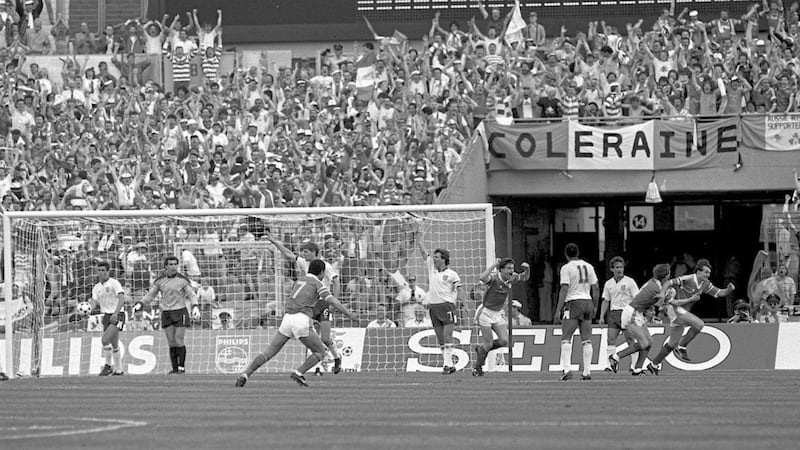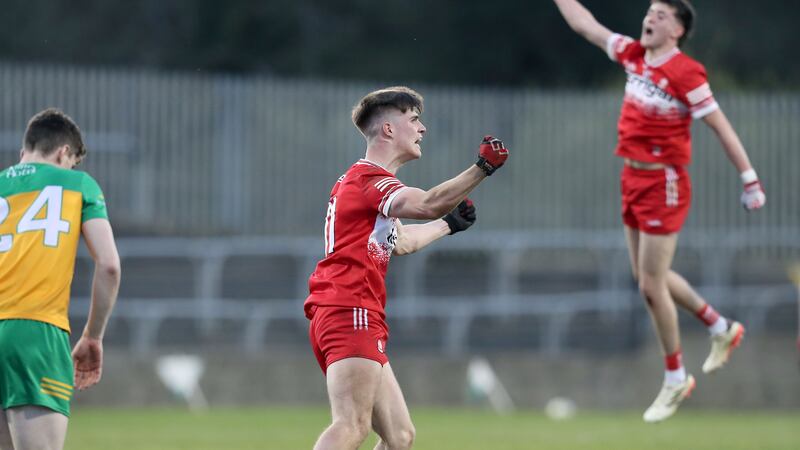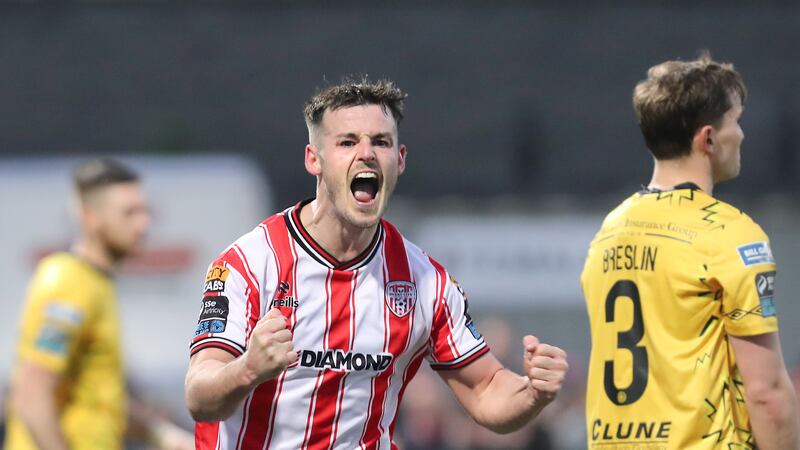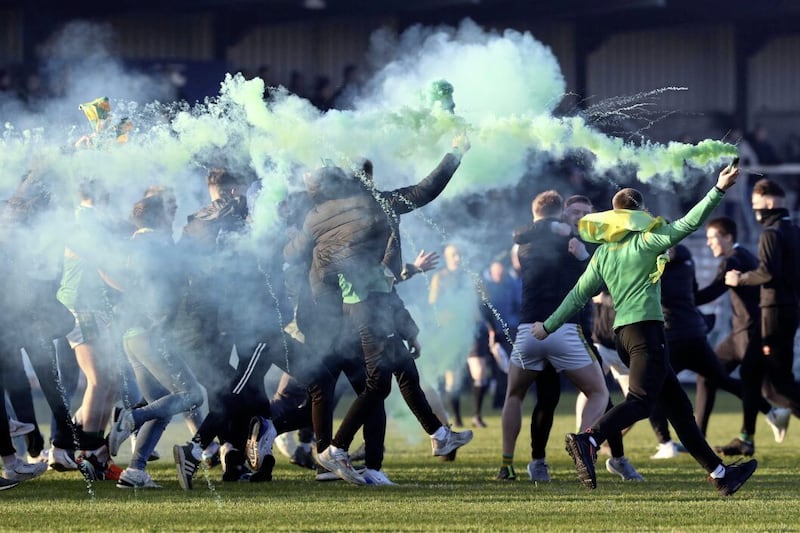Out on the bikes on Saturday morning we were talking about Jack Charlton and soccer.
I recalled a documentary that was made in the '80s about a spate of sectarian attacks on local GAA clubs.
Slaughtneil was one of the clubs that was targeted. Their hall was vandalised and daubed with graffiti.
In the documentary, a club official was interviewed about the incident.
“What happened?”
“They broke into the club, and they tore down curtains, and broke furniture, and painted bad things on the walls.”
“What did they write?”
“UVF and Man Utd.”
Some younger readers, and perhaps older ones who grew up in soccer ‘bubbles’ will not understand that response.
They will not understand the mind of a person who knew ‘Man Utd’ would cause offence, and they’ll not understand the mind that was offended by it.
However, the vast majority of people reading this article, northern nationalists from rural areas steeped in the GAA will understand precisely.
It wasn’t that soccer was a ‘foreign game.’
It was more to do with the fact that soccer wasn’t ‘our’ game. Soccer was grand – it just had nothing to do with ‘us’.
A few years later, yours truly was bouncing around the same Slaughtneil hall in my Republic of Ireland soccer jersey.
Put Em Under Pressure at Slaughtneil’s teenage disco. A riot of energy and sweat. It was brilliant.
We’re all part of Jackie’s Army
We’re all off to Italy
And we’ll really shake them up
When we win the World Cup
Cos Ireland are the greatest football team
Olé, Olé, Olé, Olé….
In those heady summers, Jack Charlton helped to make soccer palatable – even in Slaughtneil.
I always liked Big Jack. Plain and direct, he was unvarnished, unfashionable and unapologetic for being that way.
Not one for sugar-coating, he preferred route one in all things. You can trust such men. We trusted Jack.
Anyone seeking to gain a full insight into Jack Charlton is urged to read the masterful Jack and Bobby by Leo McKinstry.
When attempting to capture the essence of a man’s personality, it’s all too easy to succumb to anecdotes and stereotypes which often only provide half the story. McKinstry paints the full picture.
For example, many of the features written about Big Jack since he passed away have alluded to his famous misery.
He would wash his own socks when staying in hotels.
True. But here’s another story told by McKinstry.
When Jack’s great journalistic friend, Jimmy Mossop visited him at a hotel in Bilbao where he was staying while working as a commentator at the 1982 World Cup he found Jack “leaning out his window hanging socks and underpants over a makeshift clothesline. He explained that he had sprinkled soap powder onto his clothes and literally danced on them in the shower.”
But Mossop added a crucial footnote. ITV was footing Jack’s bill. “The hotel’s prices had offended him.”
Jack was the son of a coalminer. In 1966, Bob Charlton famously missed the World Cup semi-final between England and Portugal because he was one mile underground.
In an interview Bobby Charlton remembered his father going to work in the morning with a satchel that contained: “Bait (sandwiches), bottle (water), lamp, carbide, tabs (cigarettes),” then smiling while tapping his pockets, Bobby added: “but nae money”.
Like his father, Big Jack was also a smoker.
Before a game against Latvia, Alan McLoughlin recalled the manager calling everyone in for a team talk.
“Jack got us all together. From his jacket he pulled out a fag packet. Jack explained, ‘You’ve got to watch…’ Then he seemed at a loss for words. He was looking down at his packet but it obviously did not make any sense to him. Suddenly he said: “I’ve brought the wrong bloody fags.”
Jack still remembered the main take home point.
“Oh balls, don’t worry about them,” he said. “Just this lad with the long hair. If you stop him, you’ll win easily. Right, on the bus.”
Jack’s inability to recall the name of the long-haired Latvian rings true. He was terrible with names.
Liam Brady was ‘Ian’ - the Moors murderer. Paul McGrath was ‘John.’ Tony Cascarino was ‘Ice Cream Man’. David Kelly was sometimes ‘Eddie’ and sometimes ‘David’.
Before a game against Northern Ireland, he instructed Alan McLoughlin to watch Alan McLoughlin. He meant Alan McDonald.
On another occasion when talking about Brazil, he referred to ‘the Marijuana’ stadium rather than ‘the Maracana’.
While Big Jack might have struggled to remember his players’ names, they clearly adored him, none more so than Paul McGrath.
In his autobiography, ‘Back from the Brink’ McGrath wrote: “Jack has treated me better than I ever deserve to be treated. He has covered for me, dug holes for himself by making excuses for me. He has always defended me no matter what the weight of evidence against me. He’s been like an old mongrel; no matter how many times you kick him, he will always come back on side.”
As a footballer, Jack Charlton was fiercely competitive.
In Jack and Bobby, the former Stoke and England player Tony Allen described the 6ft 3in central defender as a “giant who would kick anything. If you were in the way, you went with it. He was really, really hard.”
Jack played Trivial Pursuit with the same intensity. Tony Cascarino remembered a game between the staff and the players.
A wrong answer about the US Presidency saw Jack’s team defeated. He picked up all the chips and threw them across the room.
“We were playing for a fiver,” said Cascarino.
With men like Jack Charlton, it’s not about the money. It’s about winning - or to be more precise – it’s about not losing.
Jack Charlton took a ramshackle, disorganised team and infused them with his hatred for defeat.
For the first time ever, Ireland qualified for major tournaments.
For the first time ever, Ireland beat England in a competitive game.
For many of us, it wasn’t necessarily about the results or the quality of the football.
It was the national fiesta that followed. It was the unity and the joy. The celebrations and the craic. The dancing and the mayhem.
Olé, Olé, Olé, Olé….
It was a wonderful time, the legacy of which is a reservoir of warm, happy, glowing memories.
For that, we must thank Jack Charlton.
So, thank you Jack. May you rest in peace.








